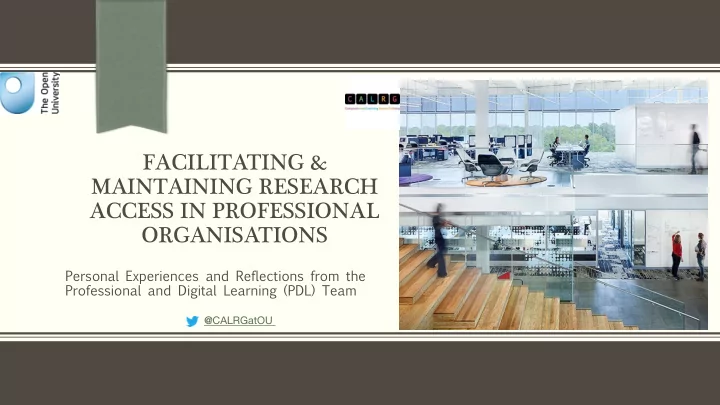

FACILITATING & MAINTAINING RESEARCH ACCESS IN PROFESSIONAL ORGANISATIONS Personal Experiences and Reflections from the Professional and Digital Learning (PDL) Team @ CALRGatOU
Introduction – About PDL § The Professional and Digital Learning programme is reimagining professional and organisational learning in an era characterised by uncertainty and rapid change. § We work with partners in diverse organisations - NGOs, multinationals, professional bodies and public organisations – to address contemporary challenges faced by society. § The Professional and Digital Learning (PDL) group aims to convene academics whose research focuses on technology enhanced workplace learning, to encourage collaboration and to capitalise on the collective knowledge of the group to advance professional learning research.
PERSONAL EXPERIENCES AND REFLECTIONS OF PDL TEAM MEMBERS
Research Access in NGOs – Dr. Jude Fransman Experiences / Challenges Reflections / Strategies Employed Effective collaboration is based on long-term • Organise agenda-setting/research-development • relationships grounded in trust and shared meetings with potential partners/collaborators outside of vision/ways of working rather than short term funding formally funded research activities. opportunities. Ensure that participants have a good prior • Should access be negotiated via formal institutional • understanding of the nature of undertaken research. channels or through individuals ? Maybe a bit of both. ‘Multimodal participatory journaling’ method to get • Research Access relationships are more likely to • access to in-depth day-to-day practices of NGO succeed where the partners have some degree of practitioners. ownership in the research. Offer incentive for participation – e.g. : a tailored • Negotiating the reporting of sensitive/critical • report focusing on the specific needs prioritized in the findings is more tricky. Where there are multiple initial collaboration meetings. This caters to the ‘impact research sites, this can be aggregated/generalized to agenda’ of many funders. avoid finger-pointing @ judefransman
Research Access in Schools and Museums - Dr. Koula Charitonos Reflections / Strategies Employed Experience / Challenges Academics agendas - academics tend to serve their own agendas § Schools are among the most challenging settings to get • and work within funding cycles. What happens when we leave the access to: DBS process, increased skepticism stemming from setting? concerns regarding use of technology (i.e. privacy, bullying). Transitions b etween roles : facilitator, participant, observer - important § Museums more willing to support and provide access to • to be open-minded in the setting, adapt and adjust . academics. They are (almost) always in need of researchers to do evaluation of projects Look for ‘gatekeepers’ : personal networks, OU alliance with schools, § Trust is a critical factor - in any partnership work building academics previously involved with work in that school. • trust entails an investment of time and energy. Plan in advance - schools do their year planning in early summer, § Establish common understanding / shared language - be • museums plan exhibitions over several years. explicit about the ‘ What ’, ‘ Why ’, and ‘ How ’ of your research. Offer to co-write papers , co-present , co-design, invite them to come § Element of ownership among stakeholders is essential for a • along to conferences, share findings with them. win-win situation . “In the wild” is rewarding – context is everything § @ ch_koula
Research Access in Finance Sector – Vasudha Chaudhari Reflections / Strategies Employed Experience / Challenges § Fostering good rapport with the organisational Finance is a complex and dynamic sector gatekeepers at the outset of research. • with stringent work ethics and privacy § Clear Research Plan outlining data collection policies . Hence, gaining entry into methods, time commitment required from the finance organisations required adherence professionals, and list of tangible outputs from the to strict protocols. research. Biggest Challenge – Translating niche • § As time is of the essence in finance sector, strong practice problems into generalisable interpersonal and c ommunication skills are of research questions , and then rendering utmost importance in order to maintain research the research findings into tacit access outputs customised to the financial institutions. § LinkedIn and Twitter : Building and Maintaining your digital research profile on social media. @ invictus_mind
Personal Accounts of access challenges in different sectors Researching MOOC Educators – Research in the Energy Sector – Victoria Murphy Tina Papathoma https://goo.gl/3WoxJK https://youtu.be/-_1PlNtzzgk @ ehimevicky @ aktinaki
Relevant skills for researchers – Prof Allison Littlejohn Networking - Continually building links with ‘gatekeepers’ from partner organisations. Listening - Align RQs with the needs of the organisation or sector to maximise impact. Clarity - Communicate ‘bilingually’ the why, what, where and how of the data gathering. Persistence - Gatekeepers’ priorities can change, so prepare to be agile . Planning - Prepare for the unknown (Plan ‘B’). Companies can ‘drop’ research without warning. Rigour - Focus on one project with high impact outputs , rather than a series of small studies. Outputs - Self-assess your progress in terms of outputs , not activity. Originality - Don’t tinker. Be bold. Shake the field . @ allisonl
Assess your approach Answer honestly. Score from 1 (strongly disagree) to 5 (strongly agree) 1. Networking - I continually build links with partner organisations. 2. Listening - I align RQs with the needs of others. 3. Clarity - I communicate by publishing in different formats. 4. Persistence - I am prepared to be agile. 5. Planning/ Persistence – My research plan has a risk assessment and Plan B. 6. Rigour - I focus on one project with high impact outputs, rather than a series of small studies. 7. Outputs - I have regular high-quality outputs, such as peer-reviewed journal publications. 8. Originality - My research is original to an extent that it will shake the field.
Thank You!
Recommend
More recommend